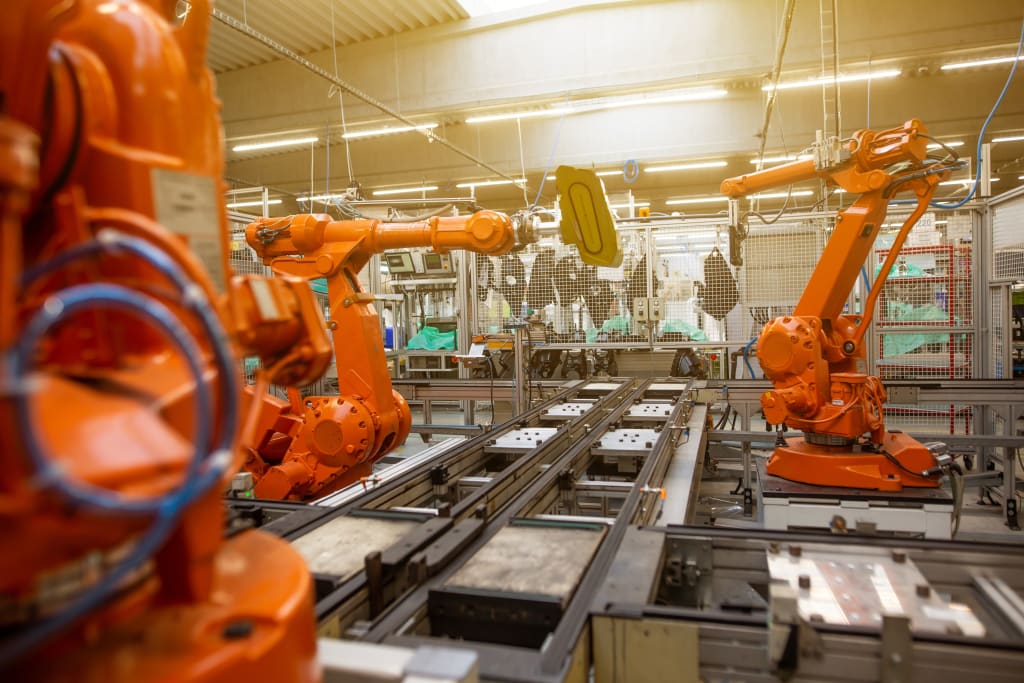Benefits of Process Automation in Manufacturing
Blog detailing out the benefits of process automation in the manufacturing industry

The manufacturing industry has undergone significant changes in technology and innovation over time, leading to more effective methods of manufacturing goods. Automation is the key factor that has helped the industry achieve higher output, lower operating costs, and increased productivity. The modern manufacturing sector has continued to find new ways to automate manual tasks and improve efficiency. Automation of the manufacturing industry is also partly driven by the skills gap, which makes it harder to find qualified workers.
This blog will take a more comprehensive look at how automation can benefit manufacturing operations.
What Is The Purpose Of Automation?
Process automation helps simplify workflows, maintains a smooth production environment, and contributes to more cost-effective operations. It helps tie all the manufacturing processes together to ensure a seamless flow between the different stages of production.
There are many reasons why businesses automate. Businesses worldwide are adopting process automation as a critical strategy to stay ahead of the competition in the long run. When we talk about automation, we picture or imagine robots and machines replacing human resources. Many small- to medium-sized enterprises feel that automation is only for the big enterprises as automation can be expensive in the initial stage. But, the fact is that automation simplifies human activities and helps reduce operational costs.
Automation by its very nature, can help improve productivity and performance significantly.
Automation at the most basic level helps improve productivity, reduce labor costs and improve product quality. It improves process flow, reduces waste, increases tracking and traceability, improves safety and generally promotes labor to higher-value tasks.
Benefits of process automation in the manufacturing sector
- Increased productivity: Process automation helps eliminate manual and repetitive tasks, increasing productivity. Automation ensures that systems can operate around the clock, optimize production schedules, and shorten cycle times. It helps reduce human error and improves equipment utilization, resulting in higher output rates and increased customer satisfaction.
- Enhanced quality control: Process automation improves quality control by executing manufacturing processes consistently and precisely. Automation enables the monitoring of production parameters, including defects or deviations, in real time. Automation also allows the achievement of any desired accuracy of the final product, minimizing variations and imperfections in the final product, resulting in higher customer satisfaction and reduced wastage.
- Cost reduction: For manufacturers, cost-saving opportunities directly translate to increase in gross margins. Automation of labor-intensive tasks can help companies reduce labor costs and enable the allocation of human resources to more value-added activities. It also reduces the risks of error and re-work minimizes material wastage and other associated costs. Automation can also optimize energy consumption and maintenance schedules, leading to further cost savings.
- Inventory management: Automation of inventory management helps manufacturers optimize supply chains and lower inventory costs. It provides real-time data on inventory levels, production schedules and demand forecasts, enabling accurate planning and timely replenishment. Process automation helps manufacturers to achieve a leaner and more efficient management process, reduce stockouts, and minimize excess inventory levels.
- Improved safety: Automation in the manufacturing workplace increases safety by handling riskier operations and reducing exposure to hazardous tasks. Process automation helps set a safe working environment by Implementing safety protocols by integrating of sensors and safety alarms to improve safety.
- Scalability and flexibility: Process automation enables manufacturers to scale and flex to adapt to changing market conditions. These systems can be configured and integrated with new technologies to accommodate production requirements. Automation allows increasing or decreasing production volumes, introducing new product variants, ordering customization, and more.
- Faster time to market: Adoption of process automation helps accelerate the production cycle and improves the time to the market. Reducing the production lead time can enable companies to respond quickly to market demands to gain a competitive edge. Automated processes coupled with analytics and data-driven decision-making can optimize production schedules, identify bottlenecks and make proactive adjustments for faster product launches.
- Improved ROI: Automation leads to reduced lead times that help lower operating costs and improve output, leading to better return on investments. A report from Deloitte states that process automation can help achieve payback in less than 12 months.
Conclusion
Using process automation to transform the manufacturing industry can result in many benefits, including improved quality, optimized operations, productivity, efficiency, scalability and more to achieve sustainable growth in this rapidly evolving and competitive market. However, implementing process automation can be challenging and complex. It requires resources and specialized skills that experienced services can provide for digital process automation that can provide end-to-end support for designing, deploying and maintaining process automation solutions.
About the Creator
Ryan Williamson
A professional & security-oriented programmer having more than 6 years of experience in designing, implementing, testing & supporting mobile apps developed. Being techno geek, I love to read & share about the latest updates in technology.






Comments
Ryan Williamson is not accepting comments at the moment
Want to show your support? Send them a one-off tip.